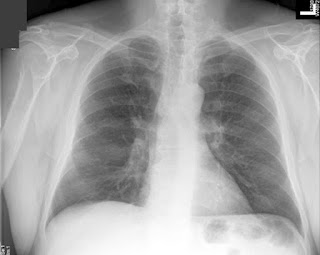Detecting Lung Cancer - A man is admitted to the hospital with a history of weight loss, increasing tiredness and chronic cough. He has been a smoker for more than fifty years. After initial investigations, a CT scan is ordered which shows advanced metastatic bronchial carcinoma. At this point the condition is effectively incurable and the prognosis is poor. Scotland has one of the highest rates of lung cancer in the world and as I've written previously on this blog - early detection is crucial to improve outcomes. A large new trial is set to take place in Scotland to assess the reliability of a blood-test for early detection of lung cancer. 10,000 people who have smoked more than 20 cigarretes for more than 20 years (>20 pack years) are being entered into the trial. A screening trial in the US previously looked at 53,000 smokers and found that CT scanning led to early detection and improved outcomes. The problem with CT scanning is that it is expensive and has a false positive rate of approximately 50% (the test suggests the presence of disease but turns out to be incorrect). This new blood test which has been developed can detect about half of lung cancers with a false positive rate of only 7%. The full results of the trial are expected in 2014. In the meantime, chest X-rays are also good imaging modalities for early detection of malignancy and are generally performed on all acute medical hospital admissions (see above example). On another note, further evidence has emerged now to show that aspirin can help to prevent cancer, particularly colorectal cancer, when associated with controls not taking daily aspirin, over a period of five years. On the balance however, patients taking daily aspirin are at higher risk of haemorrhage therefore this needs to be taken into account. It's too early to say that everyone should take aspirin to reduce their risk of cancer.
Charcot Foot - An easily missed diagnosis. A type I diabetic patient is admitted with a warm, swollen red foot. The complications from his diabetes include peripheral neuropathy and nephropathy. Plain X-rays of the foot show metatarsal neck fractures. The patient is advised not to weight bear. MRI confirms a diagnosis of acute charcot joint. This is a destructive joint condition which usually occurs in diabetic patients who have reduced sensory innervation. Even in a diabetic foot clinic, one study showed that 19 of 24 cases were not diagnosed correctly. Differential diagnosis includes cellulitis, gout, DVT or ankle sprain. Failure to diagnose the condition early can lead to joint deformity, particularly if the patient continues to weight bear. Pain is not always present due to peripheral neuropathy. Infection and neuro-arthropathy are not mutually exclusive and may co-exist. Important first line investigations include findings of fractures or bony misalignment in the absence of any obvious trauma. MRI is the most useful diagnostic test. These patients should be advised not to weight bear, and should have their foot in a cast for three to six months ideally. This is an easily missed diagnosis and one to look out for!




